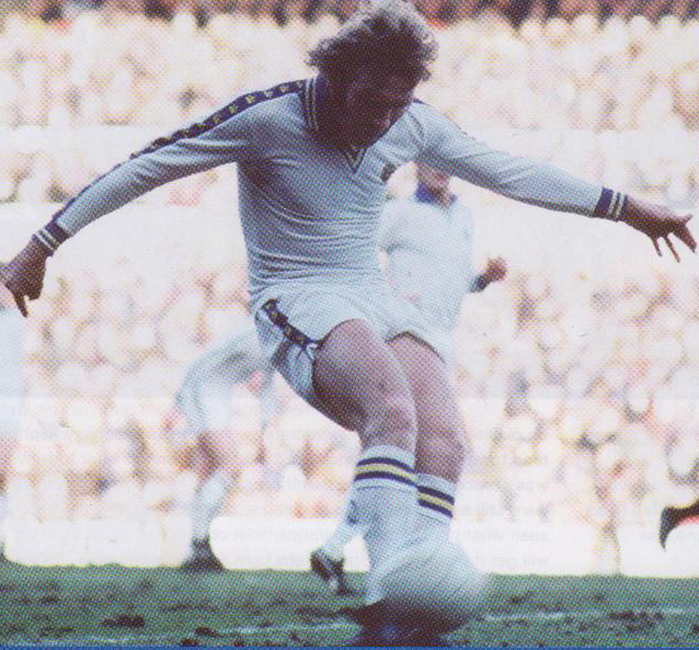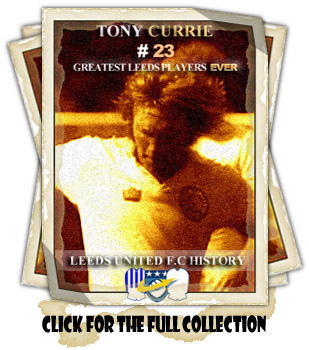

Currie: Anthony William (Tony)
1976-1979
(Player Details)
Midfield
Born: Edgeware, London: 01-01-1950
Debut v West Bromwich Albion: 21-08-1976
5’11” 12st 9lb (1977)
#23 in 100 Greatest LUFC Players Ever

He attended Childs Hill Junior School and Whitefield Secondary Modern, Crinklewood, and
represented Hendon Boys before signing amateur forms with Queens Park Rangers. He was
rejected by Chelsea after a brief spell as an apprentice, but was picked up by Watford in
May 1967 and won England Youth honours. He made a sensational start to his career at
Vicarage Road, scoring twice on debut against Bristol Rovers in a 4-0 home win on 16th
September 1967 and after only seventeen League games, in which he scored nine goals,
including two hat-tricks, he was transferred to Sheffield United in February 1968 for
£26,500. Watford had agreed to the transfer only after they had been eliminated from the
F.A. Cup. By a quirk of fate it was the Blades who made that come to pass by winning 1-0
at Watford in the Third Round of the F.A. Cup on 27th January 1968. Currie scored for his
new team on his debut with a header in a 3-2 win over Tottenham Hotspur at Bramall Lane on
26th February 1968, but missed the next game as it was his wedding day. There was no happy
climax to the season for Currie or the Blades as they had to be content with Second
Division football as they were relegated from the First Division at the end of the
1967-68 season. Currie was a showman and crowd-pleaser whose extravagant skills and
buccaneering style made him a hero to a generation of Sheffield United fans for his
effervescent and exuberant attacking midfield play, with the vision and ability to strike
long dangerous passes, and was United's most skillful ball player since the days of Jimmy
Hagan. Currie won some representative honours by playing for the England Under-Twenty-Three
team and the Football League. He scored on debut for the Under-Twenty-Three side on 1st
October 1969 at Ashton Gate, Bristol as England won 2-0 with Currie getting the England
second goal in the eighty-ninth minute to make the game safe. He was also on target in his
second game when he score the third goal in the sixtieth minute of a 4-1 England win over
Bulgaria at Home Park, Plymouth on 8th April 1970. His third cap came on 14th October 1970
at Filbert Street, Leicester, when England beat West Germany 3-1. There was a fourth cap
in a 2-2 draw with Scotland at Hampden Park on 24th February 1971, when Currie got the
equaliser with ten minutes to go to take his goal tally to three in four games. When the
Blades won promotion in 1970-71 with an attacking team put together by manager John Harris,
their inspiration was Currie in the iconic No. 10 shirt. Going up into the top-flight was
one of three great personal peaks in Currie's career. He was twenty-one at the time, and
he dictated the tempo of a team that always tried to go forward when he was pulling the
strings. Blades fans knew it was Currie who conducted the orchestra from midfield,
spotting the openings and spraying the passes that captured their imaginations. He fitted
the times perfectly. In full flow he was a memorable sight. Fleet-footed with a powerful
physique, long blond hair flying in his own slipstream, shirt flapping outside his shorts,
he made the ball do exactly what he wanted. His game combined speed and strength with
visionary passing over any distance. He could bend a moving or dead ball spectacularly,
coax it with subtle chips and flicks or hammer it into the net with venomous force before
blowing kisses to the crowd. Yet there was nothing of the prima donna about him. He
protected his talent with a robust physical presence and could win the ball as well as
use it. He was a gladiator, and Bramall Lane, still open then on one side because of its
summer usage by Yorkshire Cricket Club, was his arena. Playing on the First Division stage
afforded Currie greater exposure, and having represented England's Youth and
Under-Twenty-Three teams, he was finally picked by Sir Alf Ramsey for the seniors against
Northern Ireland at Wembley on 23rd May 1972. It was an inauspicious start as England
were defeated 1-0 and Currie was taken off in the fifty-eighth minute and replaced by
Martin Peters. Alf Ramsey stuck with his tried and true favourites and Currie was not
picked again for over a year until England played USSR in Moscow in a friendly on 10th
June 1973. In the meantime Currie was paying his dues with the Under-Twenty-Three team.
On 1st June 1972 he was part of the team that drew 2-2 with East Germany in Magdeburg and
then three days later he scored his fourth Under-Twenty-Three goal in eight games when he
completed the scoring in the last minute of a 3-0 win over Poland in Warsaw and just
three days later they held USSR to a 0-0 draw in Kiev. He gained his tenth Cap as England
beat Wales 3-0 at the Vetch Field, Swansea on 29th November 1972 courtesy of a Malcolm
MacDonald hat-trick. An impressive run was continued as the Netherlands were beaten 3-1
at Highbury on 2nd January 1973 and won his twelfth cap in a 2-1 win over Scotland at
Rugby Park, Kilmarnock on 13th February 1973. A Charlie George goal in the third minute
was sufficient for Currie to finish his Under-Twenty-Three days with another win
against Czechoslovakia in his thirteenth appearance at Villa Park Birmingham on 7th
March 1973. Alf Ramsey's England won his return match 2-1 and Currie was installed in the
team for the next six months, in which time England played another four internationals.
There was a 0-2 defeat in Turin on 14th June 1973, a 7-0 thumping of Austria at Wembley
on 26th September 1973, in which Currie picked up his first goal, the 1-1 draw with Poland
which saw England eliminated from the 1974 World Cup at the qualifying stage on 17th
October 1973 and a 0-1 defeat by Italy at Wembley in a friendly with Fabio Capello getting
the winner with four minutes to go. Inevitably after that run of poor results Alf Ramsey
departed and so did several players. Currie was not picked again until almost two years
later when Don Revie was living up to his word of giving everyone a chance. On 3rd
September 1975 he played in a 2-1 friendly victory over Switzerland in Basle. Playing for
his country was another personal milestone, yet he was to win just seventeen caps between
1972 and 1979, a total which did scant justice to his ability. At that time in particular,
England managers seemed unwilling or unable to build teams around their most inventive
players, so Currie was too often wastefully overlooked. At Bramall Lane he went on to
score fifty-five goals in three hundred and thirteen League appearances and was also made
captain in March 1974. He also scored twice in eleven F.A. Cup games, of which one was as a
substitute. He scored three goals in twenty-two League Cup games and seven goals in thirty
other games. It might have been different had he moved earlier in his career to a bigger,
more 'fashionable' club. There was no shortage of admiring suitors, but he stayed to play
three hundred and seventy-six games in all games for the Blades, scoring sixty-six goals.
However, after the Blades were relegated at the end of the 1975-76 season, it was never
going to be long before making the glamour move to Leeds United when Jimmy Armfield paid
Sheffield United £240,000 for Currie in June 1976. Although not able to emulate the dominance
of the Don Revie era, Leeds were still a major power, and Currie, filling two voids in the
Leeds side, the roles of playmaker and crowd-pleaser, vacated by John Giles and Duncan
McKenzie respectively, was virtually ever-present in his three seasons at Elland Road, where
the fans idolised his mix of flamboyance and commitment. An immediate success, Currie’s first
season saw Leeds reach the semi-finals of the FA Cup, and the player himself regain his place
in the England squad. The next two seasons proved a frustration, as although he was on top of
his form, scoring some spectacular goals, the team itself was woefully inconsistent. An
injury to teammate Trevor Cherry was the reason for Currie's recall to the England team, as
he came on as his replacement in the sixteenth minute of a 3-1 win over Wales at Ninian
Park, Cardiff, with England already one up from a Bob Latchford goal in the eighth minute.
After Wales had equalised in the sixty-third minute Currie scored his second full
international goal to give England the lead in the eighty-second minute and future Leeds
player Peter Barnes put the result beyond doubt with one minute to go. Three days later he
retained his place in Ron Grenwood's team in a 1-0 win over Northern Ireland at Wembley.
Just three days after that he was at Hampden Park to play his part in another 1-0 win,
this time over Scotland. He picked up his twelfth cap and scored his third goal as England
comfortably beat Hungary 4-1 at Wembley. He missed two 1980 European Cup Qualifying games,
with Denmark and the Republic of Ireland, but was back for the friendly with Czechoslovakia
at Wembley on 29th November 1978 which England won 1-0, and gained his fourteenth cap on
7th February 1979 in a 4-0 win over the Republic of Ireland in an European Cup Qualifier.
Northern Ireland were next to be beaten as England won another European Qualifier 2-0 at
Windsor Park Belfast on 19th May 1979. Four days later there was a 0-0 draw with Wales at
Wembley in an home international and in his seventeenth and final England game there was
another 0-0 draw with Sweden in Stockholm on 10th June 1979. Currie undoubtedly played the
best football of his career with Leeds, but left before the start of 1979-80, moving to
Queens Park Rangers for family reasons, for £400,000. He captained them to the 1982 F.A.
Cup Final, before injuries checked his progress. He had spells with Toronto Nationals and
Vancouver Whitecaps and non-League Chesham United before joining Southend United, but did
not play for them. He moved to Torquay United in February 1984 as a non-contract player but
his League career came to an end in June 1985 when a serious knee injury forced him to
retire, after scoring once in sixteen games. He later played for Dunstable Town, Hendon and
Goole Town and in February 1988 he became Sheffield United's Football in the Community
representative, a position that he still enjoys. Apart from seventeen full caps for England
he also represented England Youth, The Football League three times and England
Under-Twenty-threes thirteen times. His nephew, Darren Currie, also a midfielder, has
played for numerous clubs including Brighton & Hove Albion, Wycombe Wanderers, Barnet,
Plymouth Argyle, Ipswich Town, Coventry City and Derby County on loan, and Luton Town.